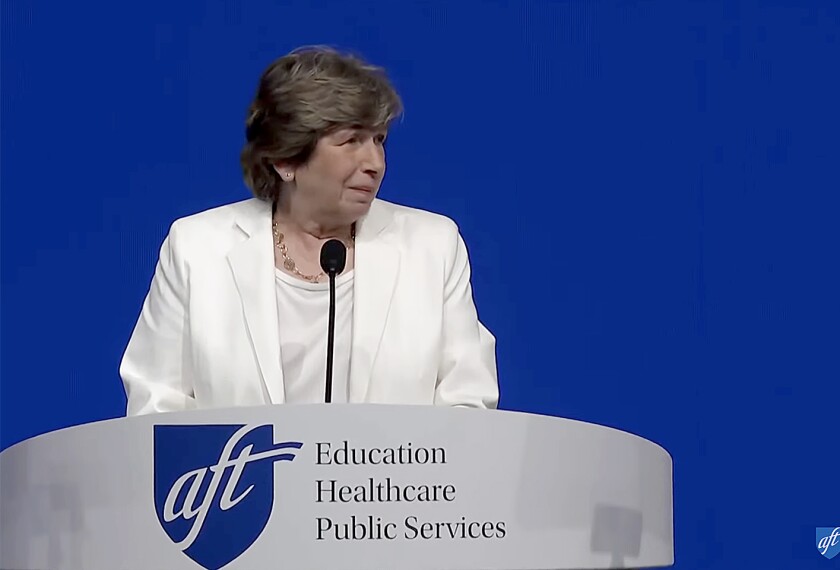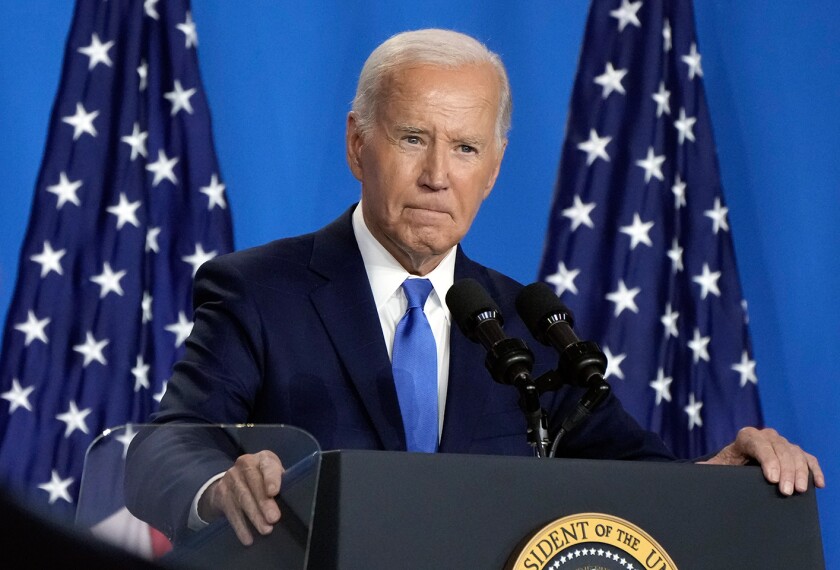The National Education Association is ready to spend $40 million this election year. But it isn’t ready to endorse a candidate for president.
The American Federation Teachers, by contrast, is working aggressively for U.S. Sen. Hillary Rodham Clinton of New York, who represents the home state of more than a third of the union’s 1.3 million members. The union isn’t united, though: Its Illinois affiliate and the Chicago local are recruiting volunteers for their state’s favorite son, U.S. Sen. Barack Obama, Sen. Clinton’s chief rival for the Democratic nomination.
Meanwhile, the 3.2 million-member NEA’s state affiliates are making their own decisions. Some are endorsing candidates, including the Illinois Education Association-NEA, which is backing Sen. Obama. Several affiliates have remained neutral but seen their leaders make personal endorsements, all among Democrats.
After voters in 24 states go to the polls for the Super Tuesday primaries and caucuses next week, including in California, New York, and Illinois, the NEA may be ready to pick a candidate. The board of the union’s political action committee is scheduled to meet Feb. 7 and may decide then to endorse one of the Democrats, having already ruled out all the Republican contenders.
The union’s political workers are “absolutely poised” to put its resources behind a candidate, said Karen White, the NEA’s director of campaigns and elections.
‘So Much at Stake’
While both national teachers’ unions are using different tactics, they are each making decisions that will ensure they have clout in the long run, one union observer said. By supporting Sen. Clinton, the AFT is protecting its relationship with an important politician who represents so many of its members, and the NEA is hedging its bets against backing a candidate who might eventually lose the nomination, said Joseph Williams, the executive director of Democrats for Education Reform, a New York City-based political action committee.
“In both cases, the unions can say they’re playing it somewhat safe while getting involved on the ground,” said Mr. Williams, who has been critical of the unions’ opposition to charter schools and merit pay.
The NEA and the AFT are officially nonpartisan and include both Democrats and Republicans among their members. But in electoral politics, the longtime political powerhouses nearly always endorse Democratic candidates, offering donations from their political action committees and volunteers from the rank and file.
Both unions are so active this year because there’s “so much at stake,” said Mr. Williams, whose PAC’s board includes Democrats such as Alan Bersin, a former schools superintendent in San Diego, Kevin Chavous, a former city councilman in the District of Columbia, and several Wall Street bankers who serve on charter school boards.
With President Bush leaving office and the next president likely to have a role in shaping the No Child Left Behind Act and federal proposals to create merit-pay programs, the unions want to have established relationships with whoever is in the White House or on Capitol Hill, Mr. Williams said.
“They want to be in a position where they’re not playing much defense” in 2009, he said.
The unions’ different approaches to the 2008 campaign reflect their distinct governance rules and particular demographics, according to one union watchdog.
Of the AFT’s members, 200,000 work in New York City and another 350,000 work elsewhere in New York state. That’s one reason that the union’s national leadership endorsed Sen. Clinton in October, said Mike Antonucci, the director of the Education Intelligence Agency, an online newsletter and blog that reports on and criticizes teachers’-union activities.
The AFT’s internal rules also vest a lot of power in its leaders to make decisions about political endorsements, Mr. Antonucci said.
The NEA’s membership is more spread out across the country, and its rules distribute the power to make political decisions across various committees. As of now, the union has told its members that all of the Democrats are acceptable candidates for president, but the leadership hasn’t expressed a preference for any of them.
The union “papers over its differences [among its members] and allows the affiliates to do what they want to do,” Mr. Antonucci said.
The state affiliates have functioned very differently from each other until now. NEA-New Hampshire endorsed Sen. Clinton and former Arkansas Gov. Mike Huckabee, a Republican, in the state’s Jan. 8 primaries. The NEA’s affiliates in Iowa and Nevada, meanwhile, did not back any candidate for the caucuses in those states on Jan. 3 and Jan. 19, respectively.
However, the leaders of the NEA affiliates in those states endorsed candidates on their own. Linda Nelson, the president of the Iowa State Education Association, backed Sen. Obama, who won her state’s caucuses. Several members of the ISEA board of directors supported former U.S. Sen. John Edwards of North Carolina, who finished second by a narrow margin ahead of Sen. Clinton.
Ms. Nelson said she felt obligated make a statement because she has been politically active as a former state legislator and a delegate to the Democratic National Convention in 1992 and 2004.
If she hadn’t made an endorsement, she said, “my members would have said: ‘What’s wrong with Linda? Why didn’t she get involved in the campaign?’ ”
While the ISEA didn’t endorse a candidate, it did urge its members to become active participants in their local caucuses. On Jan. 1, the union made phone calls with a recording of Ms. Nelson encouraging attendance at the caucuses.
It also published extensive guides to participating in the caucuses , including a list of proposed resolutions on education issues. The resolutions called for full funding of federal special education programs and for revisions to the NCLB law so that data other than test scores could be used to measure schools’ effectiveness.
The Nevada State Education Association published similar guides in preparation for that state’s caucuses.
AFT on the Ground
While the NEA’s efforts vary widely across the states, the AFT’s work is focused on supporting Sen. Clinton. The AFT will not disclose how much it plans to spend on election activities this year.
In New Hampshire, the union had a “significant ground operation” to help the Clinton campaign, said Edward J. McElroy, the AFT’s president. Sen. Clinton reversed sliding poll numbers to win the state’s primary on Jan. 8.
“We had the whole enchilada, from identifying voters to getting out the vote to doing visibility work at events,” Mr. McElroy said. “You’ve got to have people willing to stand out in the cold for a few hours” to draw attention before a candidate’s appearance, he added.
To provide volunteers, the national union also rented buses to bring in members and retirees from New York and across New England, Mr. McElroy said. It also assigned political operatives from other states to work in the early primary and caucus states.
The NEA’s affiliate in Nevada was formally neutral. But when the state union joined a lawsuit that protested allowing casino workers to attend at-large caucuses in their workplaces, many political observers saw that as an attempt to dilute support for Sen. Obama, who had drawn the endorsement of the powerful culinary union.
Super Tuesday Divide
With the approach of Feb. 5—dubbed Super Tuesday for the number of contests and delegates at stake—the presidential campaigns have kicked into high gear. The AFT plans to be active in several states, especially New York.
But the national union will not be working in Illinois.
“I don’t expect to see many AFT people here,” said Pamelyn Massarsky, a lobbyist for the Chicago Teachers Union.
The 33,000-member CTU, which doesn’t donate money to federal candidates, is organizing volunteers for its home-state candidate. So far, more than 100 have agreed to work for Sen. Obama by going door to door, making calls from phone banks, and assisting in other campaign activities, Ms. Massarsky said.
The state affiliates of both the NEA and the AFT are engaging in similar efforts to help Sen. Obama.
Although the national AFT has endorsed Sen. Clinton, it does not expect its Illinois members to turn against Sen. Obama, Mr. McElroy said.
“There’s no controversy here,” he said. “It’s all right with us. There’s no harmed relationship.”




